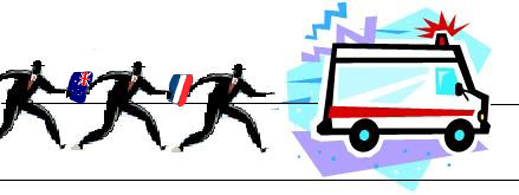
By John Helmer, Moscow
A fight over fees by Australian lawyers claiming to launch a compensation claim on behalf of one of the victims of the MH17 shoot-down revealed last week in an Australian state court that the top officials of the Australian Government are unable to confirm evidence of what crime was committed, or who committed it when the aircraft was destroyed, and its 298 crew and passengers, including 38 Australians and 196 Dutch, killed on July 17, 2014.
In the Netherlands, meanwhile, a lawyer who has claimed to be representing Dutch kin in pursuing criminal and civil court suits on behalf of the victims, has declared: “Our government must clearly express that it is an illusion to believe that any study ever could lead to prosecution of the individual offenders.”
A secret file by the Australian Attorney-General to the Prime Minister, setting out the admissibility of evidence for prosecuting the crime, has recommended against a public declaration by the Government of what happened, and who is responsible. The disclosure of the file, though not of the secret evidence or of the internal Australian Government debate over its contents, comes just days before the Dutch Safety Board (DSB) is due to issue its final report on the causes of the crash.
The Australian Government revelations are indirect. They appear in the text of a judgement issued on October 1 by Judge John Bond of the Queensland Supreme Court. Following a hearing on September 9 and 10, and written submissions a week later, Bond decided that Shine Lawyers, a firm specializing in accident and injury compensation, were not entitled to withhold a case file it had compiled for advising Werner Lupker until he paid up fees and charges totalling $20,643.50 (US$14,690). A Dutch citizen and resident of Australia, Lupker (below, left) was the spouse of Dafne Nieveen (right), a Dutch language teacher who was killed on board MH17.
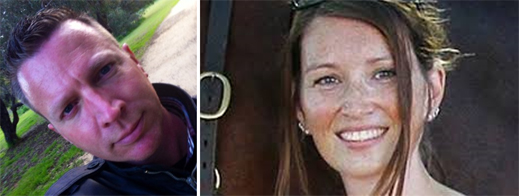
She and Lupker had lived and worked in Perth, Western Australia, for four years. Lupker had retained a Brisbane, Queensland, lawyer, who claims to be an aviation specialist, to represent him. This lawyer’s name is Joseph Wheeler (below).
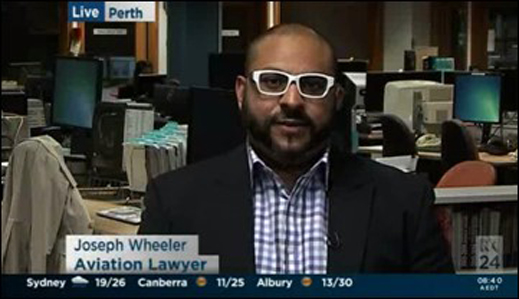
Source: http://image.jimcdn.com
According to the text of Bond’s judgement, when Wheeler recently decided to resign from the Shine firm and set up an office for himself, Shine demanded that Lupker pay fees and charges for the work the firm claims to have done. Unless Lupker paid, he was told in August, Shine would not release the case file. Wheeler, meanwhile, had arranged with Maurice Blackburn, another company of accident and injury litigators, to start legal action. “The applicant [Lupker] followed the solicitor [Wheeler] who had had the conduct of his file from one firm to the other,” said the judge.
In the case file, which Bond has now ordered Shine to hand over, there was correspondence from a Dutch lawyer named Antoinette Collignon, with whom Shine had announced a partnership to pursue court cases for MH17 victims. The Shine announcement came on August 27, 2014, a month after the crash. Collignon (below, left), who is a partner at the Dutch law firm, LegalTree, and two Swedish lawyers, Stefan Eriksson (centre) and Urban Olson (right), were reportedly engaged together

“to assist as advocates for the rights of European and Australasian families of flight MH 17 passengers and will continue to add suitably and appropriately experienced and qualified international partners to supplement the considerable international efforts required to demand both criminal justice and civil compensation from all potentially liable parties.”
In the Australian court, Nieveen’s name wasn’t identified, nor were any details of court claims which Wheeler, Collignon. or the Swedes have started. In fact, when asked directly, they can substantiate no court action, neither in Australia, nor in The Netherlands. Each of the lawyers refuses to answer questions about the Lupker case, or any other claim they are working on for MH17 victims. Point blank, they will not say they have MH17 case clients, nor what individuals or governments they are suing for what cause.
Wheeler, whose website says he obtained a certificate in aviation law from a university in Montreal, Canada, practises out of a Brisbane apartment which appears to be his home. He claims to be selling “aviation legal, research, and strategic legal and policy consulting solutions to provide advice on effective legal public and private aviation priorities and infrastructure projects, as well as discrete aviation legal applications worldwide (IALPG Consult).” A partner Wheeler claims to to have in Rostov-on-Don, in Russia, turns out to be based in Montreal.
Asked to clarify what he believes the evidence shows for a criminal or civil law claim in the MH17 case, Wheeler said by telephone that he won’t answer questions on the matter. He gave no reason.
The Bond judgement is limited to ordering the handover of the Lupker case file from Shine to Wheeler and Maurice Blackburn, with the proviso that if in the future, Lupker wins compensation from a court case, the amount claimed by Shine would be repaid. In his judgement, Bond read into the record the terms which Lupker had agreed with Wheeler when they signed a legal representation agreement. These provide that Lupker would be liable to pay the lawyers a maximum of 23% of whatever compensation award he received from a court case. The amount of his compensation subject to repayment to Shine would not include “my USD$50,000 advance compensation payment, nor my Australian Government Department of Human Services ‘Australian Victim of Terrorism Overseas Payment’ of (up to) AUD$75,000, should the MH17 attack be declared by the Australian Prime Minister and I receive such a payment before the resolution of my Montreal Convention claim.”
The $50,000 advance payment has been decided by Malaysian Airlines, along with its insurers. The calculation of the amount and the final payout depend on official determinations of the cause of the crash, according to the rules of the International Civil Aviation Organization (ICAO), and the 1999 Montreal Convention; this limits airline liability and compensation. Comparable $50,000 advance payments have been made by Malaysian Airlines to survivors of passengers lost on the MH370 flight of March 2014.
The disclosure of the terms for payment of A$75,000 for Australian victims of overseas terrorism is more sensitive, and politically very significant. This is because, to date, the Australian Prime Minister and government have refused to issue a declaration that under the applicable Australian law the shoot-down of MH17 was a terrorist act. The statute of 2012 created a government-funded compensation scheme for victims provided that “the Prime Minister… declare that a relevant overseas terrorist incident is one to which the Scheme applies.” It also established “eligibility criteria so that payments can be made to either long-term Australian residents who are victims of a relevant overseas terrorist act, or in the event of the death of a victim, close family members.”
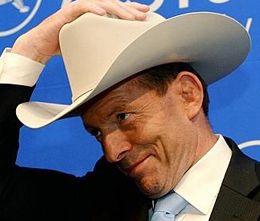 In 2013 then Prime Minister Tony Abbott (right) authorized this outline of the scheme. The government ministry responsible confirms that just 8 acts have been declared by the Prime Minister to qualify. They include the September 11, 2001, attacks on the World Trade Centre in New York; bombings in Bali, Indonesia, in 2002; and in 2013 shooting attacks on a shopping mall in Nairobi, Kenya. The MH17 event has not been declared a terrorist act by the Australian Government.
In 2013 then Prime Minister Tony Abbott (right) authorized this outline of the scheme. The government ministry responsible confirms that just 8 acts have been declared by the Prime Minister to qualify. They include the September 11, 2001, attacks on the World Trade Centre in New York; bombings in Bali, Indonesia, in 2002; and in 2013 shooting attacks on a shopping mall in Nairobi, Kenya. The MH17 event has not been declared a terrorist act by the Australian Government.
One week after the event, Abbott was reported by the Australian state radio as saying the MH17 case might qualify. “Obviously,” he said, “it was one of the very early measures of the new government to put in place the Australian Victim of Terrorism Overseas Payment system and I have sought advice on that.” Abbott was referring to a report requested from the Australian Attorney-General, George Brandis (below, left).
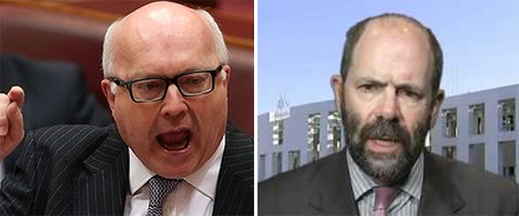
Don Rothwell (right), a professor of international law at the Australian National University, was reported as commenting: “The fact that the Prime Minister made this observation a few days ago, and we’ve yet to see any government action on it, would suggest to me the Government is getting carefully considered legal advice as to how to respond to this issue. There is a live legal question at the moment as to whether what has occurred is a war crime, a crime against humanity or an act of terror.”
This week, according to Rothwell, there has been no legal advice from Brandis and no declaration by the prime minister that the cause of the MH17 crash and the cause of death were a terrorist act. “MH17 has yet to be declared an overseas terrorist act,” Rothwell now says, “though that does not mean that such a declaration could not be made in the future. If legal advice had been received by the government (which I suspect that it has), then the PM of the day retains options as to how they proceed. Australia would have been keen not to make a declaration that may have been seen to prejudge the outcome of international investigations into the loss of MH17 (including that of the Netherlands).” Rothwell adds that the Attorney-General’s brief “is kept strictly confidential unless the government chooses to release it; this legal advice is also not subject to FOI [Freedom of Information] requests.” The Australian Parliament also has no legal right to intervene, ask for a copy of the Attorney-General’s paper, or publicly question state officials about it.
Abbott, who was replaced last month as prime minister by Malcolm Turnbull, publicly claimed in November of 2014 that he knew what had caused the MH17 crash, and who had been responsible. “We were given very strong security advice in the days following the atrocity as to the type of weapon, as to the place from where the weapon was fired and as to the likely prominence of the weapon and there’s been nothing since then to question that original security advice.” By “prominence” Abbott meant provenance, and Russia. Abbott’s claims referred back to the US Government statement in the United Nations Security Council on July 18, 2014, that a Buk ground-to-air missile, fired by separatists in eastern Ukraine under Russian command and control, had caused the crash. For that statement by Ambassador Samantha Power (left) , following meetings with President Barack Obama and Secretary of State John Kerry, read this.
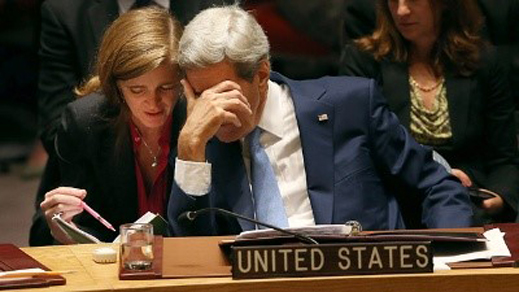
For the sequence of events leading to the Power statement, see.
Fifteen weeks later, by the time Abbott spoke in November, he had been briefed on the evidence gathered by Australian pathologists and the Victorian State Coroner from the bodies of MH17 victims. No evidence of shrapnel from a Buk missile warhead had been found. For that story, read on.
Since last month the Australian government has ordered the coronial evidence – despite open publication last November and December – classified as secret. If not a Buk missile, what and who had caused the crash have been debated among Australian government officials, while publicly Abbott and the foreign minister, Julie Bishop, have continued to claim a Buk missile was the cause of the crash, and the Russian Government in Moscow responsible.
The refusal of the Australian officials to make the statutory declaration that they have the evidence under Australian law to declare a terrorist act suggests they don’t have the evidence at all. Until now, noone has noticed the convergence of the Australian autopsy evidence in the Coroners Court in Melbourne, and the revelation in the Brisbane court that the government is refusing to declare a terrorist act.
Rothwell believes that whether the conflict in eastern Ukraine is regarded as terrorism by the government in Kiev, or civil war by the Novorussian side, attacking a civil airliner is a war crime. “The status of the conflict and whether it was an international or non-international armed conflict would not be determinative as this is a war crime in either state or conflict.”
Prosecuting the crime, and those responsible for committing it, would be, according to Rothwell, open to Australia, The Netherlands, Malaysia, the US, or any of the signatories to the Rome Statute for the International Criminal Court (ICC) at The Hague.
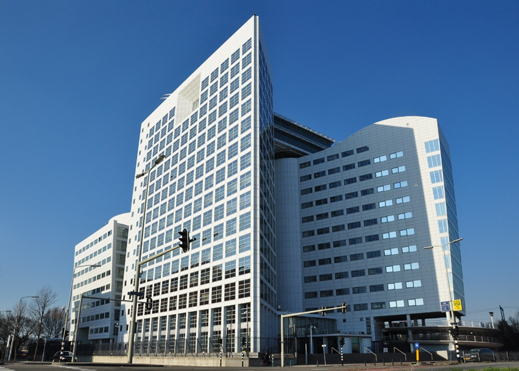
“As Australia is a party to the Rome Statute,” says Rothwell, “it is required to have domestic laws in place to prosecute persons responsible for war crimes and crimes against humanity. As both of these crimes are ones over which universal jurisdiction applies, it is possible under Australian law to prosecute non-nationals for such crimes. Given there is a connection between the loss of MH17 and Australia, there would also be an incentive to prosecute under the Act.”
“There have been no prosecutions under Australian law since this legislation was modified at the time Australia became a party to the Rome Statute, or post 9/11 for a foreign terrorist act by a non-national. So any MH17-related prosecution would create fresh precedent for Australia. My view is that while it is technically possible to prosecute under Australian law, Australia would much prefer any prosecutions to take place before an International Court or Tribunal, or for another directly affected country to commence prosecutions (Netherlands/Malaysia). Two reasons immediately come to mind: 1) difficulty in getting an accused before an Australian court 2) difficulty of gathering the evidence together for a prosecution in Australia.”
Dutch lawyers working on the evidence for the deaths of the Dutch nationals on board MH17 include a large number advertising their expertise in pursuing compensation claims in air crashes, like Collignon for LegalTree. Reviewing the Dutch media and also other lawyers and prosecutors working on the MH17 case, a total of 8 Dutch lawyers have identified themselves or been named as actively engaged.
They include Gertrude van Wassenaer and Evert Wytema; Peter Langstraat of Moree Gelderbloom; Jeroen Bosch; Rene Hebly of SAP; and Jeroen Kuyper of Beer. On the Beer website it is claimed: “Beer advocaten has a special aviation team. Where necessary, we work together with specialised law firms abroad….[Beer] currently represents surviving relatives of the passengers who died in the MH17 crash.” Each of these lawyers was asked to confirm the names of the MH17 families they represent; the court or courts in which they are proceeding; and the target and cause of their litigation.
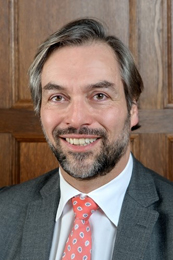 None was willing to substantiate their advertisements. Van Wassenaer wrote to say: “My colleague Evert Wytema, who is working on this case with the MH17 team of lawyers, is currently on holiday.” He hasn’t returned. Langstraat was identified by Kuyper as the official spokesman for the group, but when asked to substantiate that he, his firm, or the group have been retained by MH17 clients, he replied: “I am sorry but I cannot give you this information at this moment.”
None was willing to substantiate their advertisements. Van Wassenaer wrote to say: “My colleague Evert Wytema, who is working on this case with the MH17 team of lawyers, is currently on holiday.” He hasn’t returned. Langstraat was identified by Kuyper as the official spokesman for the group, but when asked to substantiate that he, his firm, or the group have been retained by MH17 clients, he replied: “I am sorry but I cannot give you this information at this moment.”
Another Dutch lawyer, Bob van der Goen, announced last December that on behalf of a group of MH17 victims’ families, he had written to the Dutch Government, claiming it “has completely botched” the fact-finding investigation and the legal framework of the case. “Nobody knows who is doing what. There is no coordination, there is no leadership whatsoever [by] Holland.”
This week, when van der Goen was asked to confirm what MH17 victims had engaged him to represent them, in what court he was suing, and against whom, he refused to say. “We are not allowed to communicate to you such information as names of victims, etc.,” he replied.
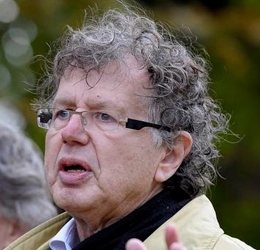 A month ago, describing himself as a former lawyer who has “also been involved in previous air disasters”, van der Goen (right) wrote in a Dutch newspaper that litigating on behalf of the MH17 victims is now impossible. “Our government needs to stop selling tubers for lemons to them [kin of victims]. Instead, [the government] must clearly express that it is an illusion to believe that any study ever could lead to prosecution of individual offenders.” According to van der Goen, the Dutch officials had made “blunder on blunder…and a laundry list of other mistakes.” The evidence for prosecution of crime, or litigating for civil compensation, has disappeared.
A month ago, describing himself as a former lawyer who has “also been involved in previous air disasters”, van der Goen (right) wrote in a Dutch newspaper that litigating on behalf of the MH17 victims is now impossible. “Our government needs to stop selling tubers for lemons to them [kin of victims]. Instead, [the government] must clearly express that it is an illusion to believe that any study ever could lead to prosecution of individual offenders.” According to van der Goen, the Dutch officials had made “blunder on blunder…and a laundry list of other mistakes.” The evidence for prosecution of crime, or litigating for civil compensation, has disappeared.
For the Dutch Government’s compilation of its official statements on the MH17 crash, open this file. According to van der Goen, none of the investigating countries has legitimate authority to prosecute, “if only because the Netherlands and the other countries mentioned are possible suspects themselves — and they refuse to see this. So the case will be endlessly shelved. Eventually, it will be adopted at a parliamentary inquiry that mistakes were made, but then noone will still be awake. Excellent solution.”
Rothwell notes that the ICC has no jurisdiction to consider an act of terrorism, and there would be problems for national courts of “getting an accused person before a domestic court. Seeking to extradite someone from Russia (for example) to the Netherlands/Malaysia/Australia would be legally and politically very complex without the active cooperation of the Russian government… That is why having a special court/tribunal with the backing of a UN Security Council resolution assist to circumvent those difficulties as UN member states would be under an obligation to cooperate.”
How to understand the legal reasoning for a UN tribunal created by an alliance of like-minded states, if they are, in Van Der Goen’s assessment, suspects themselves? Rothwell declines to comment.











Leave a Reply